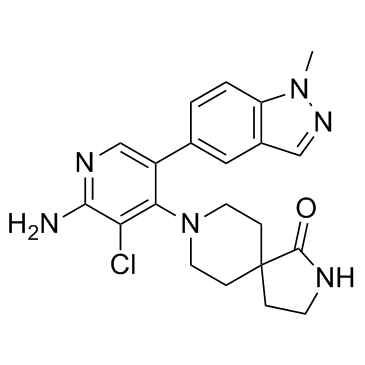| Description |
CCT-251921 is a potent, selective, and orally bioavailable CDK8 inhibitor with an IC50 of 2.3 nM.
|
| Related Catalog |
|
| Target |
CDK8:2.3 nM (IC50)
CDK19:2.6 nM (IC50)
|
| In Vitro |
CCT-251921 has acceptable aqueous solubility and demonstrates minimal activity when tested in a panel of 55 receptors, ion channels, and enzymes at 1 μM and in a panel of 279 kinases; weak inhibition of CYPs is observed. CCT-251921 demonstrates potent inhibition of reporter-based readouts measuring basal WNT pathway activity in human cancer cell lines that have constitutively activated WNT pathway signaling: LS174T (β-catenin mutant), SW480 and Colo205 (APC mutant) or PA-1 human teratocarcinoma cells that are WNT ligand dependent[1].
|
| In Vivo |
CCT-251921 shows improved oral pharmacokinetics and pharmaceutical properties in order to facilitate further evaluation of CDK8/19 pharmacology and progression into preclinical efficacy and safety studies. In APC-mutant SW620 human colorectal carcinoma xenograft model, CCT-251921 treatment reduces mice tumor weight (54.2%) at day 15. The inhibition of STAT1SER727 phosphorylation is maintained for more than 6 h after the last dose[1].
|
| Cell Assay |
7dF3 cells are treated with CCT-251921 ranging in final concentration from 90 μM to 0.3 nM. After 2 h of further incubation, β-oestradiol is added to a final concentration of 10 μM. The cells are incubated and then 25 μL of luciferase reagent is added and mixed. After leaving the plate for 60 min at room temperature, luminescence is read on a plate luminescence reader[1].
|
| Animal Admin |
Mice: Animals are dosed orally by gavage every 24 h at 0.1 mL per 10 g body weight. Tumors are measured three times weekly by Vernier calipers and body weights recorded. At the end of the study, animals are culled at intervals: 3 control and 3 treated at 1, 2, 6, and 24 h after the final dose. Heparinized blood is collected by cardiac puncture, spun, and plasma snap frozen for analysis of compound exposure. Tumors are excised, weighed and samples snap frozen for compound quantification and PD analyses. The 30 mg/kg q.d. schedule is well tolerated with no significant body weight loss. Tumor growth is significantly inhibited[1].
|
| References |
[1]. Mallinger A, et al. Discovery of Potent, Selective, and Orally Bioavailable Small-Molecule Modulators of the Mediator Complex-Associated Kinases CDK8 and CDK19. J Med Chem. 2016 Feb 11;59(3):1078-101.
|
